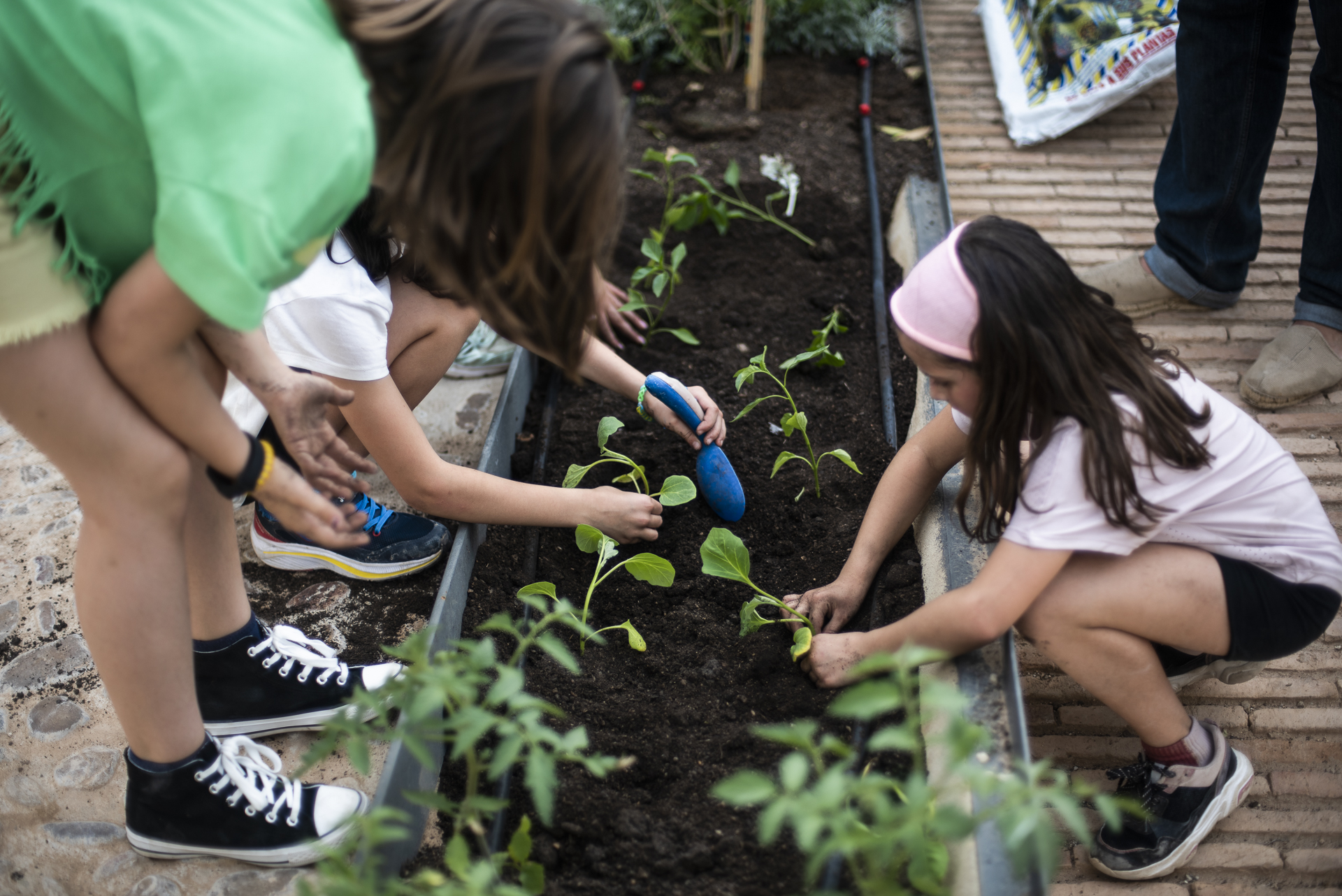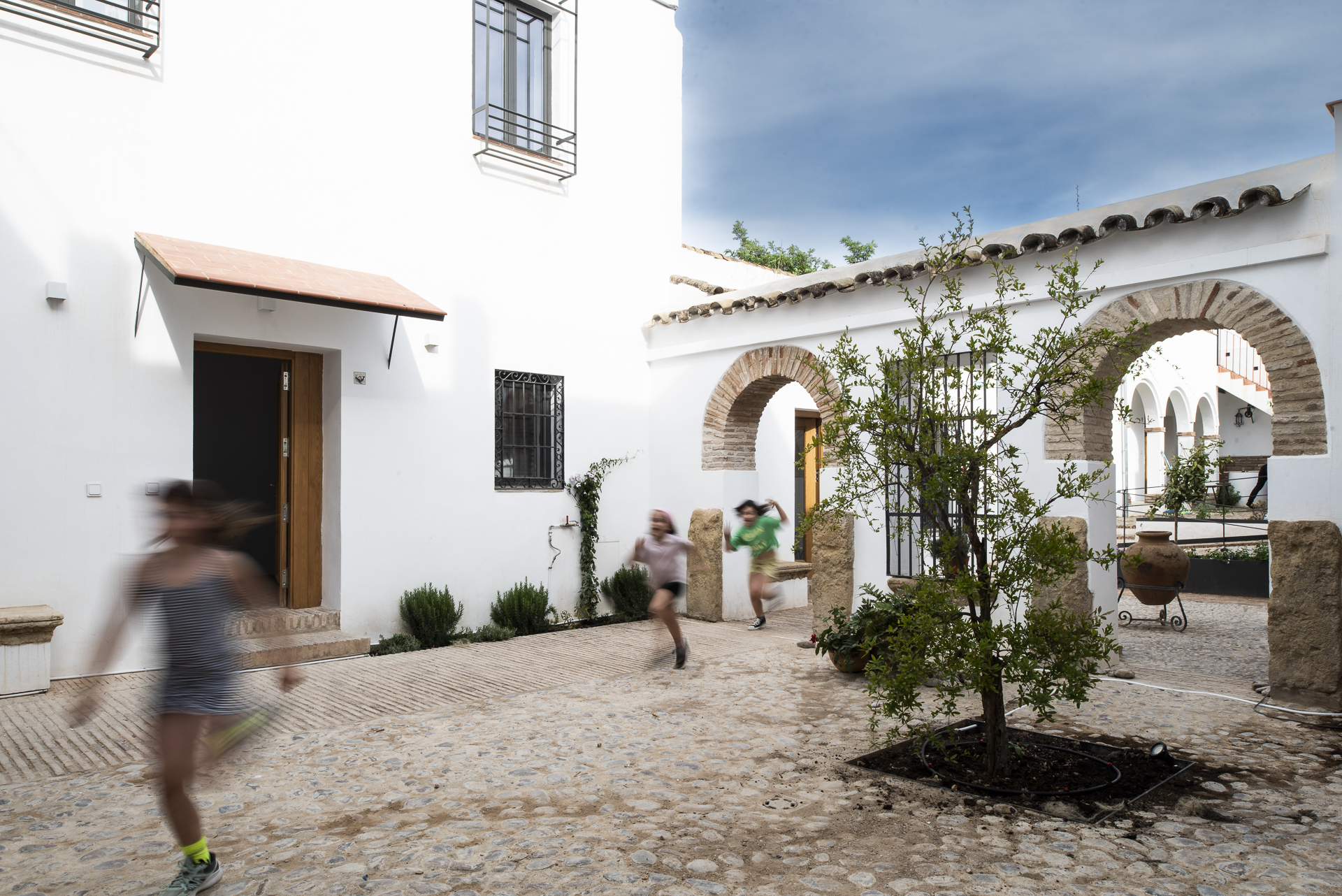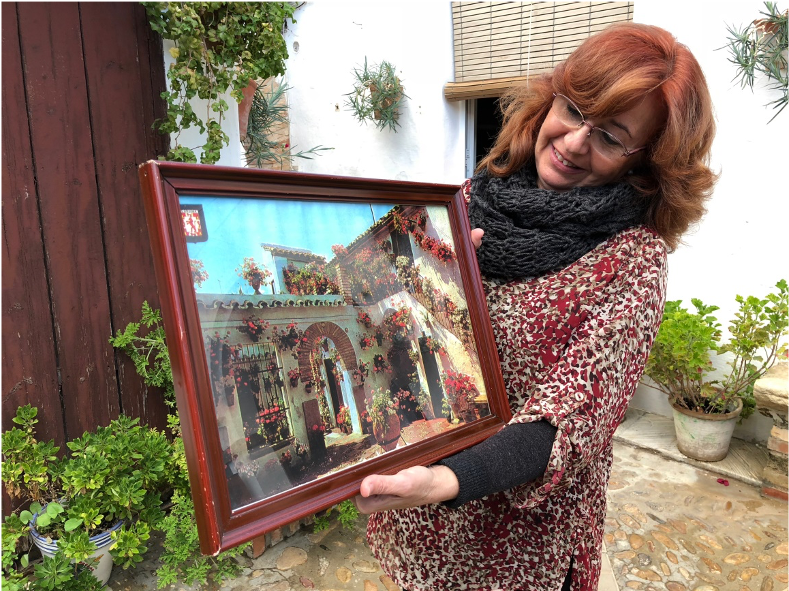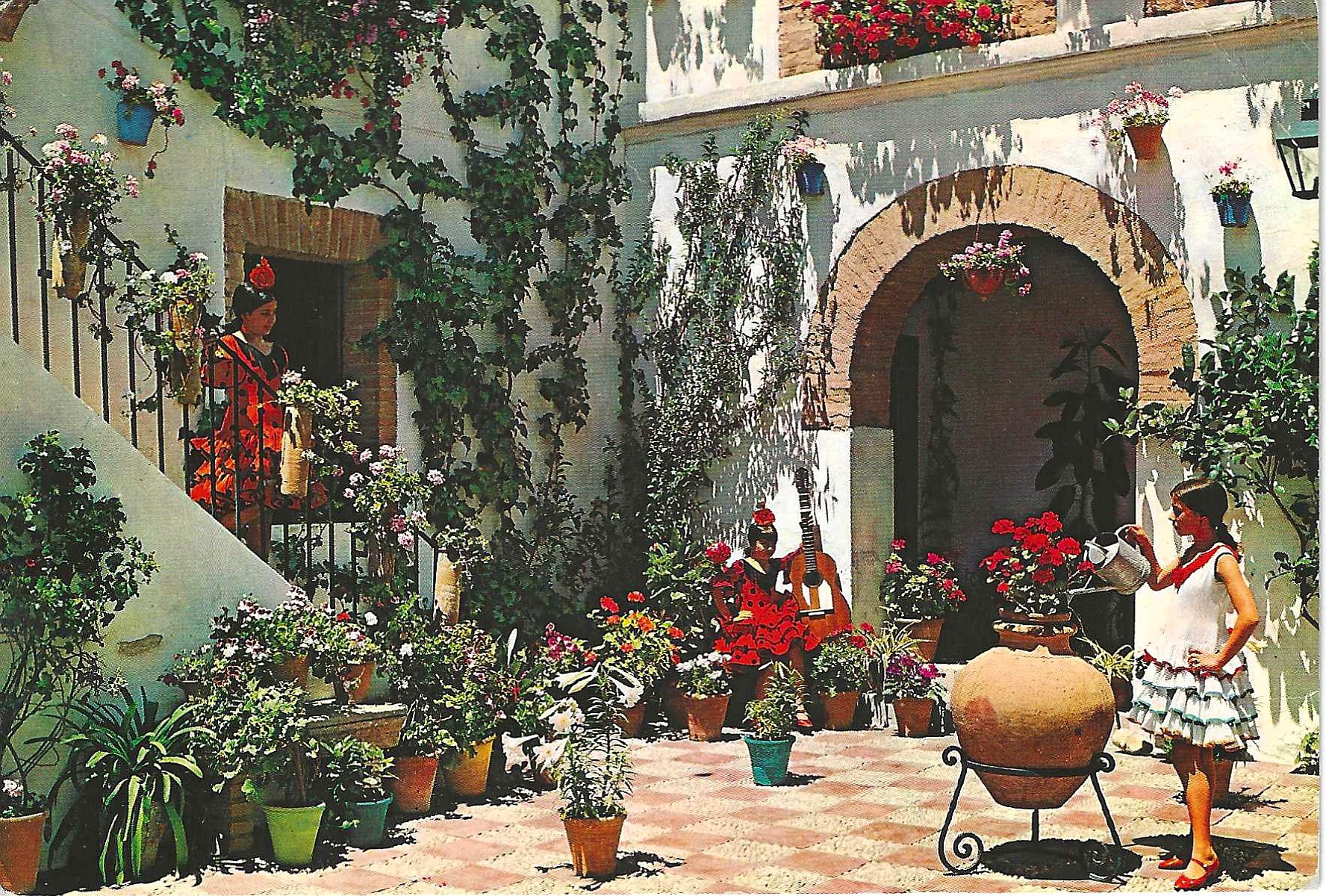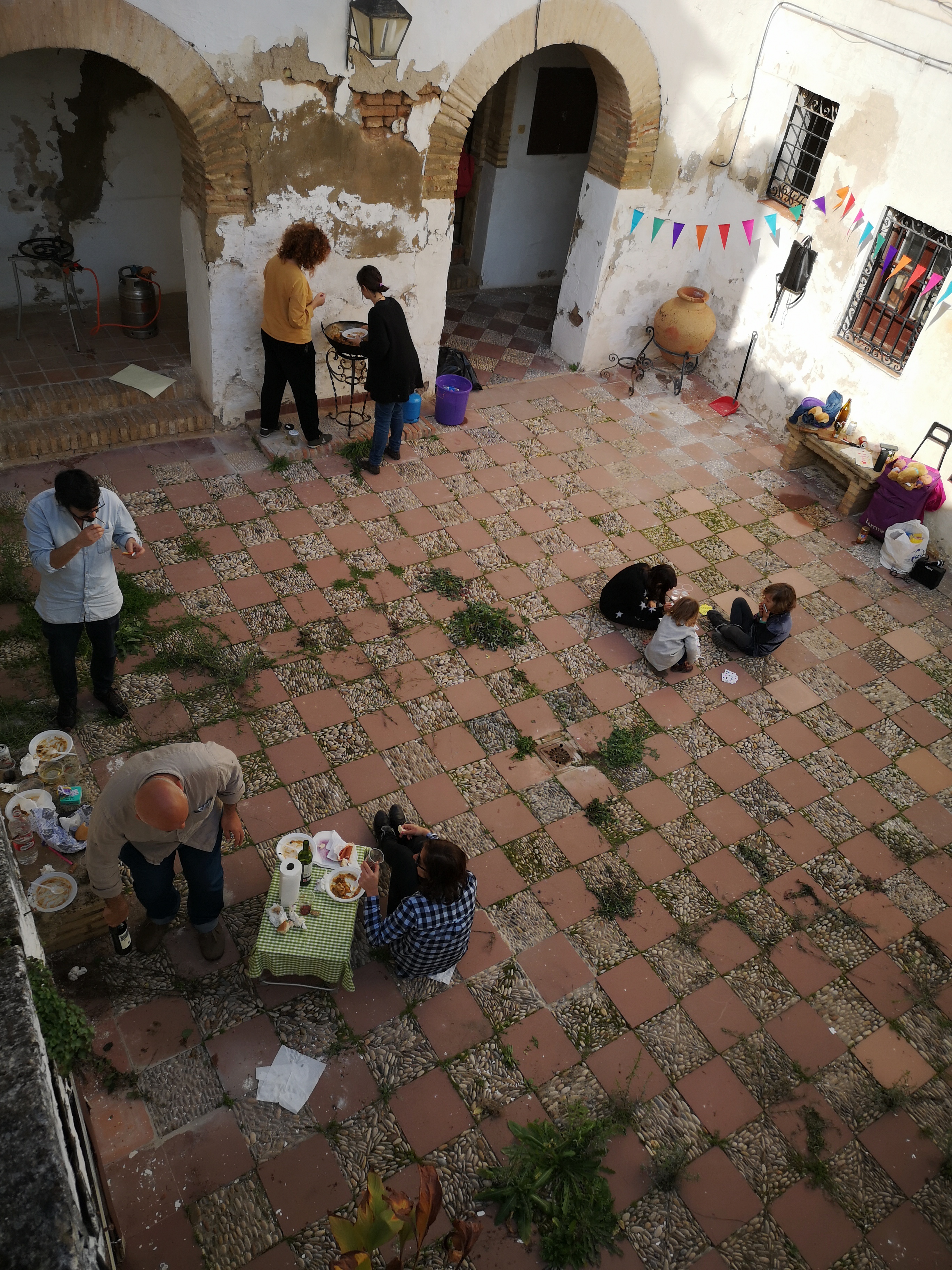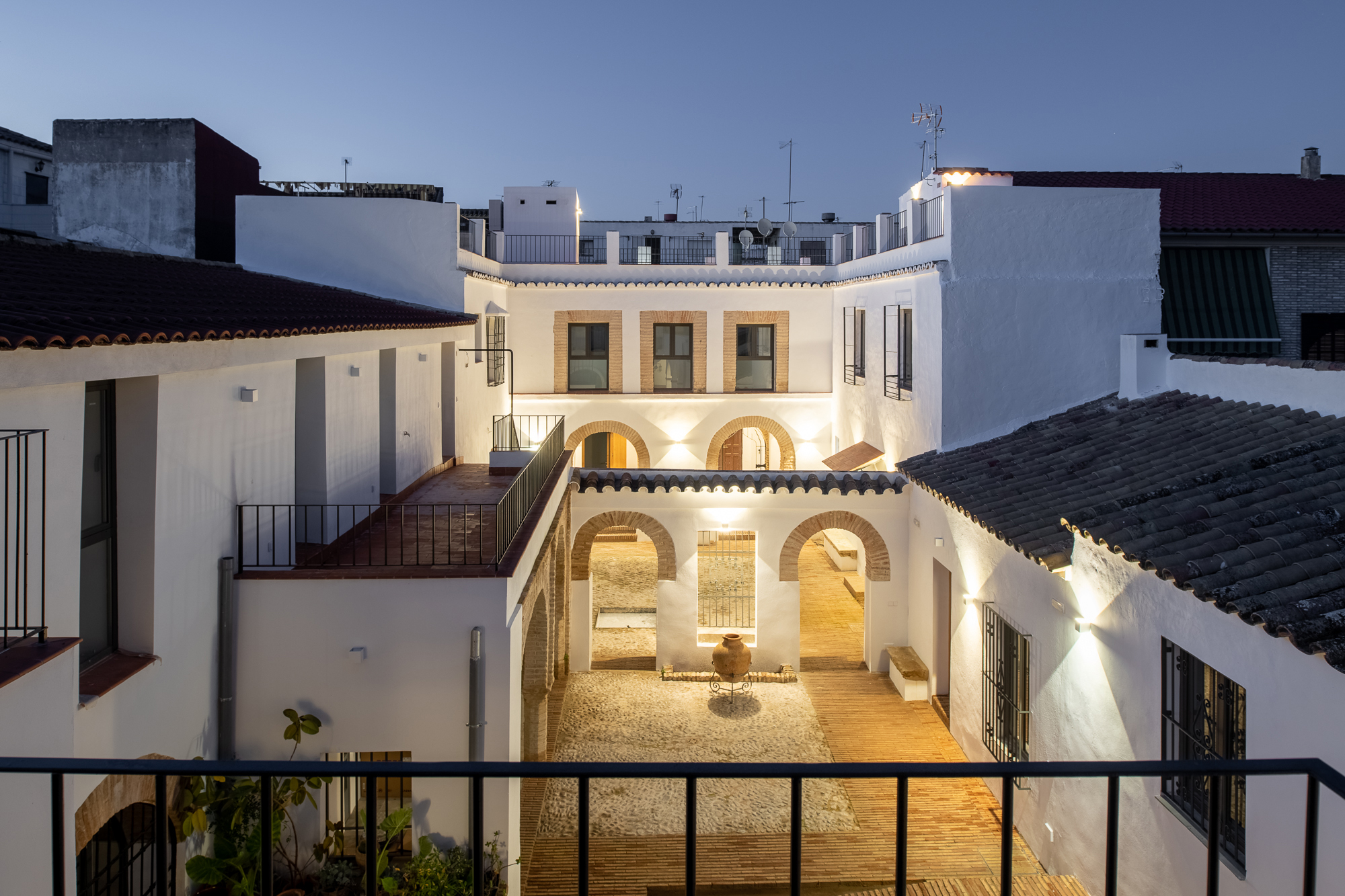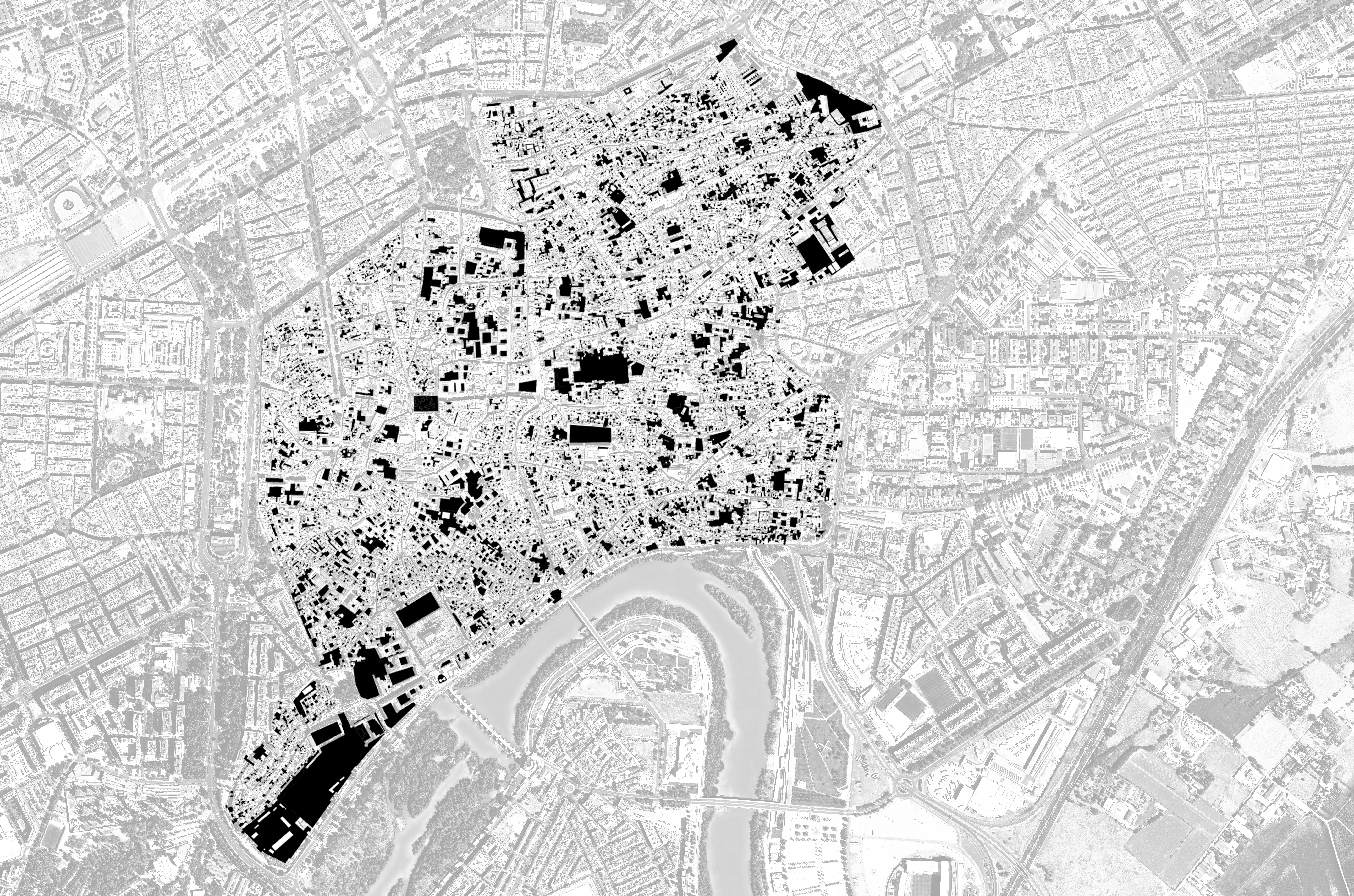Regaining a sense of belonging
PAX
PAX–Patios de la Axerquia. Making city with the community
PAX is an initiative promoted by architects and anthropologists that aims to create affordable housing through cooperative processes, reusing traditional typologies in Córdoba through social innovation strategies. PAX tries to reinforce a Heritage Community and acts as a vector of civil society to promote a change in the collective imaginary to empower citizens and create residential opportunities to safeguard the coexistence in patio-houses as an alternative to depopulation and touristification
Spain
Local
Córdoba
Mainly urban
It refers to a physical transformation of the built environment (hard investment)
Yes
2022-04-29
Yes
Horizon2020 / Horizon Europe
No
Yes
Yes
Yes
As a representative of an organisation
Following a decades-long real estate bubble involving a culture of ownership and occupation of land in Spain, PAX implements an innovative system of governance in Córdoba as a laboratory that fosters a new urban model consistent with the aims of a Beautiful, Sustainable and Inclusive City. A system of multilevel co-management with social economy provides the basis for the acquisition & cooperative use of empty historical courtyards as a model of urban regeneration through social innovation in an heritage context. Through the recovery of patio-houses, PAX promotes cooperative and affordable housing models, avoiding speculation and touristification that threaten European historic centers. The physical transformation of these patios not only improves the habitability and energy efficiency of the houses but also strengthens the social fabric, enabling the creation of supportive communities that restore the original spirit of traditional patio-houses and the ecosocial value of them.
The abandonment of these houses is not only generating an emptying of the historic center and its degradation, but it is also loosing the traditional Mediterranean way of life: as a social and green cell, strengthening social ties and encouraging community life. PAX wants to preserve it, both in the material and immaterial heritage, thanks to the collective memory and the consolidation of an Heritage Community, according Agenda 2030 and Faro Convention Network, Council of Europe initiative of witch it is a member.
Investing in cooperative housing models in these spaces not only protects their heritage value but also guarantees fair access to housing, strengthens social cohesion, and contributes to the sustainability of the historic city. The project is aimed at residents, public administrations, third-sector organizations, architects, urban planners, and heritage professionals engaged in innovative sustainable rehabilitation practices.
The abandonment of these houses is not only generating an emptying of the historic center and its degradation, but it is also loosing the traditional Mediterranean way of life: as a social and green cell, strengthening social ties and encouraging community life. PAX wants to preserve it, both in the material and immaterial heritage, thanks to the collective memory and the consolidation of an Heritage Community, according Agenda 2030 and Faro Convention Network, Council of Europe initiative of witch it is a member.
Investing in cooperative housing models in these spaces not only protects their heritage value but also guarantees fair access to housing, strengthens social cohesion, and contributes to the sustainability of the historic city. The project is aimed at residents, public administrations, third-sector organizations, architects, urban planners, and heritage professionals engaged in innovative sustainable rehabilitation practices.
Cooperative housing
Urban regeneration
Social innovation
Heritage community
Sustainable cities
Inspired by Roman Domus and Islamic courtyards, PAX promotes an urban ecology based on the densification and regeneration of the historic city. Faced with an expansive model that consumes territory, it is committed to reusing courtyards as green and social urban systems, ensuring that Cordoba evolves as a Beautiful, Sustainable and Inclusive city. Its approach seeks to optimize resources and spaces, avoiding tourist gentrification and strengthening passive measures in traditional architecture.
Sustainability should be understood in its broadest sense: environmental, social and economic. In environmental terms, courtyards allow urban revegetation, regulate temperature and optimize natural lighting and ventilation, reducing dependence on energy resources. In social terms, they foster neighborhood cohesion and reactivate intangible heritage through coexistence. Economically, their rehabilitation drives the regeneration of the urban fabric without displacing the population, promoting cooperative housing models that guarantee equitable access and long-term stability.
PAX defends the traditional Mediterranean city model: compact, complex and inclusive. The abundance of abandoned patio-houses calls for innovative strategies to bring them back to life, fostering cohabitation in intermediate spaces that combine privacy and community life. In this context, the courtyard is more than just an architectural element, it become an essential urban strategy for ensuring the city's long-term sustainability.
From a participatory governance perspective, PAX stresses the need to involve citizens in the creation of their own habitat. The recovery of the historic center should not only be an exercise in heritage conservation, but also an opportunity to strengthen a new green economy based on the existing city. In this vision, courtyards, as social green cells, emerge as catalysts for a resilient, sustainable Córdoba, committed to the well-being of both present and future generations.
Sustainability should be understood in its broadest sense: environmental, social and economic. In environmental terms, courtyards allow urban revegetation, regulate temperature and optimize natural lighting and ventilation, reducing dependence on energy resources. In social terms, they foster neighborhood cohesion and reactivate intangible heritage through coexistence. Economically, their rehabilitation drives the regeneration of the urban fabric without displacing the population, promoting cooperative housing models that guarantee equitable access and long-term stability.
PAX defends the traditional Mediterranean city model: compact, complex and inclusive. The abundance of abandoned patio-houses calls for innovative strategies to bring them back to life, fostering cohabitation in intermediate spaces that combine privacy and community life. In this context, the courtyard is more than just an architectural element, it become an essential urban strategy for ensuring the city's long-term sustainability.
From a participatory governance perspective, PAX stresses the need to involve citizens in the creation of their own habitat. The recovery of the historic center should not only be an exercise in heritage conservation, but also an opportunity to strengthen a new green economy based on the existing city. In this vision, courtyards, as social green cells, emerge as catalysts for a resilient, sustainable Córdoba, committed to the well-being of both present and future generations.
The courtyards in Córdoba are a traditional example of how art and culture can transcend strict functionality to generate spaces that enrich emotional and social life. With minimal resources, these spaces have fostered a sense of belonging and community interaction, demonstrating that beauty is not only aesthetic, but a shared experience. Without going any further, the success of the Festival de Patios, established in 1921, has led to a crystallization of tradition, favoring an idealized image of the past over the preservation of the cultural practices that that originally shaped it.
PAX proposes a change in the collective perception, reclaiming courtyards as dynamic spaces of coexistence and wellbeing. Beyond their architectural value, these spaces stand out for their ability to connect people, stimulate the senses and improve quality of life. As María José, resident of the PAX-Astronautas cooperative - the first housing cooperative resulting from co-creation between PAX and the cooperativists- notes, their richness is not only in their appearance, but also in the emotions and relationships they harbor.
In 2020, in a context where the pandemic has shown that habitability extends beyond mere functionality, PAX highlights the use value of courtyards: flexible spaces that are adaptable to contemporary needs and compatible with the most stringent modern requirements. In contrast to the value placed on antiquity or the market, PAX reclaims their role as motors of social change, where architecture adapts to life, rather than the other way around.
The beauty of courtyards lies not only in their image, but in their capacity to welcome, inspire and transform. As a cultural and social project, PAX demonstrates that designing beautiful spaces involves sensitivity, collective intelligence and commitment to those who inhabit them.
PAX proposes a change in the collective perception, reclaiming courtyards as dynamic spaces of coexistence and wellbeing. Beyond their architectural value, these spaces stand out for their ability to connect people, stimulate the senses and improve quality of life. As María José, resident of the PAX-Astronautas cooperative - the first housing cooperative resulting from co-creation between PAX and the cooperativists- notes, their richness is not only in their appearance, but also in the emotions and relationships they harbor.
In 2020, in a context where the pandemic has shown that habitability extends beyond mere functionality, PAX highlights the use value of courtyards: flexible spaces that are adaptable to contemporary needs and compatible with the most stringent modern requirements. In contrast to the value placed on antiquity or the market, PAX reclaims their role as motors of social change, where architecture adapts to life, rather than the other way around.
The beauty of courtyards lies not only in their image, but in their capacity to welcome, inspire and transform. As a cultural and social project, PAX demonstrates that designing beautiful spaces involves sensitivity, collective intelligence and commitment to those who inhabit them.
As a member of the Faro Convention Network of the Council of Europe, PAX promotes an urban model based on equality, accessibility, and affordability. Its approach emphasizes the co-creation and transformation of cities, ensuring citizens actively shape their environment. Through participatory co-management, PAX fosters a 'Heritage Community' that brings together public administration, universities, civil society, and citizens, promoting a governance model based on dialogue and consensus.
PAX drives urban transformation by guiding communities in decision-making, ensuring initiatives are democratic and inclusive. This includes establishing housing cooperatives and repurposing unused courtyards in multi-family housing, promoting an equitable and modern coexistence model. These spaces, traditionally hierarchical, are redefined based on principles of horizontality and inclusion, with coexistence rules formed through collective agreements.
Central to this process is an informed and engaged citizenry. PAX strengthens community life by recovering both material heritage (architectural typology) and intangible heritage (communal practices). Courtyards evolve into shared living spaces and social hubs, supporting local initiatives like fair housing access, especially for vulnerable groups such as women in active aging, refugees, and marginalized communities. PAX also fosters micro-employment and responsible tourism.
PAX’s vision promotes a lively, diverse city with fair access to opportunities and resources, aiming to create a sustainable, cohesive urban environment. Its approach goes beyond architectural rehabilitation, advocating for a model built on social interaction, mutual respect, and inclusive spaces, reshaping how we inhabit our cities.
PAX drives urban transformation by guiding communities in decision-making, ensuring initiatives are democratic and inclusive. This includes establishing housing cooperatives and repurposing unused courtyards in multi-family housing, promoting an equitable and modern coexistence model. These spaces, traditionally hierarchical, are redefined based on principles of horizontality and inclusion, with coexistence rules formed through collective agreements.
Central to this process is an informed and engaged citizenry. PAX strengthens community life by recovering both material heritage (architectural typology) and intangible heritage (communal practices). Courtyards evolve into shared living spaces and social hubs, supporting local initiatives like fair housing access, especially for vulnerable groups such as women in active aging, refugees, and marginalized communities. PAX also fosters micro-employment and responsible tourism.
PAX’s vision promotes a lively, diverse city with fair access to opportunities and resources, aiming to create a sustainable, cohesive urban environment. Its approach goes beyond architectural rehabilitation, advocating for a model built on social interaction, mutual respect, and inclusive spaces, reshaping how we inhabit our cities.
The participation of civil society is fundamental in the development of the PAX´s strategy, as its involvement enables not only the identification and recovery of tangible heritage but also the creation of a strong and active community. Citizens and neighborhood associations play a key role in identifying vacant houses and driving the proposed urban regeneration process. Their knowledge of the area facilitates the location of unused houses and helps connect the supply and demand for housing. The residents of PAX-Astronautas—the first housing cooperative rehabilited by PAX—actively participated in all stages of the process, from identifying their housing needs to selecting and rehabilitating the patio-house. Through participatory workshops, they have been able to share their expectations and define the foundations of sustainable living together, ensuring that the patio-house model adapts to their lifestyles and strengthens the group's social cohesion. Additionally, they have helped raise awareness among the population about the importance of heritage and encouraged new participants to join the strategy promoted by PAX. Thanks to citizen involvement, the project has succeeded not only in restoring architectural heritage but also in strengthening community ties and fostering new ways of living based on cooperation and self-management. A key moment that reflected this impact was the award ceremony for the European Heritage Award / Europa Nostra Award 2022, which took place in the first house rehabilitated by PAX. This event brought together the community formed around the house and symbolized the recognition of a model in which civil society plays a leading role in the process of urban transformation. The ceremony was attended by members of neighborhood associations, representatives of Fiare Banca Ética, the former property owners who sold to the cooperative, the local builder, as well as official representatives and the families that are part of the cooperative.
PAX collaborates with public and private entities to facilitate the multidisciplinary and multi-level aspects of its strategy. At local level, PAX works with neighborhood associations and citizen groups, which are the key agents in its bottom-up strategy but also with the University of Córdoba in researching patios from an anthropological perspective, in preserving intangible heritage. The Institute of Advanced Studies in Sociology of Córdoba (CSIC) has worked with PAX to develop a gentrification map, providing essential demographic data for planning affordable housing strategies and preventing resident displacement. PAX works with the Córdoba City Council to create economic entities and local employment within its strategy. The Andalusian Institute of Historical Heritage contributes to updating the Digital Atlas of Intangible Cultural Heritage (PCI) by incorporating data from local patio users and preparing training activities for different stakeholders, using traditional materials like lime for the rehabilitation of historic buildings. At national level, PAX is the promoter of the Faro Spain Network and the organizer of its founding meeting in Córdoba. Since then, with the support of the Córdoba City Council, PAX has been working on consolidating a network of Faro best practices in Spain. At European level, in 2018, PAX was recognized as a Good Practice by the Council of Europe for its exemplary application of the Faro Convention on the value of heritage for society. Since then, it has been part of the Faro Convention Network. Since 2022, PAX is a partner in the Horizon 2020 IN-HABIT European project, researching how traditional practices around patios have a positive impact on people's health and well-being. PAX shares its applied research processes with the Cyprus Institute and the European Working Group (DARIAH), developing digital tools for the collective gathering of information on Intangible Cultural Heritage (ICH), which were applied in Córdoba in 2022.
PAX works with professionals in the fields of Architecture and Anthropology, adopting a multidisciplinary approach to address the double desire to pay equal attention to tangible and intangible heritage.
The project is based on the valorization of the building’s heritage, empowering both the social component of the human group and the ecological and architectural quality of the construction. Community support in adopting coexistence norms, through the cooperative’s statute to achieve social sustainability, cannot be separated from the sustainability of architectural design, its construction techniques, and the treatment of the patio as an outdoor space—both a place of coexistence and porousness. The architectural project is, therefore, a reinterpretation of heritage in contemporary terms, through a co-design process conducted with the inhabitants.
PAX is a multidimensional ecosystem: the environmental component, densifying the city and promoting the “green” patio network –green-cell system– with revegetation reduce energy consumption; the economic component, by including the social economy and local groups as protagonists in the design and implementation of the strategy, to promote social enterprises as a basis for a local micro-economy; the sociocultural dimension, with the development of cooperatives open to new ways of co-living, where recovering community spaces is central and guarantees the survival and authenticity of the patio heritage; and the technological dimension, as the process develops tools for training in restoration using traditional materials to respect patrimonial values.
PAX promotes an alternative cooperative housing model, proposing a system based on the collective management and process of living space. Through this model, access to housing is encouraged from a perspective of use rather than individual ownership, promoting residential stability, equity, and the active participation of inhabitants in decision-making.
The project is based on the valorization of the building’s heritage, empowering both the social component of the human group and the ecological and architectural quality of the construction. Community support in adopting coexistence norms, through the cooperative’s statute to achieve social sustainability, cannot be separated from the sustainability of architectural design, its construction techniques, and the treatment of the patio as an outdoor space—both a place of coexistence and porousness. The architectural project is, therefore, a reinterpretation of heritage in contemporary terms, through a co-design process conducted with the inhabitants.
PAX is a multidimensional ecosystem: the environmental component, densifying the city and promoting the “green” patio network –green-cell system– with revegetation reduce energy consumption; the economic component, by including the social economy and local groups as protagonists in the design and implementation of the strategy, to promote social enterprises as a basis for a local micro-economy; the sociocultural dimension, with the development of cooperatives open to new ways of co-living, where recovering community spaces is central and guarantees the survival and authenticity of the patio heritage; and the technological dimension, as the process develops tools for training in restoration using traditional materials to respect patrimonial values.
PAX promotes an alternative cooperative housing model, proposing a system based on the collective management and process of living space. Through this model, access to housing is encouraged from a perspective of use rather than individual ownership, promoting residential stability, equity, and the active participation of inhabitants in decision-making.
The urban regeneration strategy through cooperative processes aims to use vacant patio-houses in the historic center of Córdoba to provide affordable housing and permanent accommodation for local residents. The potential to reuse the existing city, in terms of its material and immaterial heritage, by revitalizing abandoned patio-houses in a central neighborhood destined for future gentrification, has driven the creation of a bottom-up strategy in terms of housing policy, heritage preservation, urban regeneration, and social cohesion, updating the use of patios through cooperative processes.
The unique feature of PAX compared with other housing cooperatives established as an alternative to property ownership and rental agreements, is that:
_It operates in a high-value heritage environment, updating the communal living that has traditionally characterized Mediterranean cities. It focuses on the recovery of spaces in historic centers and areas at risk of depopulation, integrating affordable housing into heritage settings without altering their cultural identity.
_The project not only seeks housing solutions but also incorporates strategies that address current climatic and urban challenges. The regeneration of degraded areas and the rehabilitation of existing housing minimize environmental impact compared to new constructions.
_The housing cooperative is an instrument of the social and solidarity economy that promotes co-housing for different groups of people. The formation of a cooperative allows for the construction or rehabilitation of a building as a collective property, in which each person or family that is part of the cooperative has the right to use a portion of the building without owning it. The project aims to function as a neighborhood urban cooperative, that unites housing, rehabilitation, and services cooperatives to generate a local microeconomy.
This represents an innovative approach that combines heritage preservation with housing accessibility.
The unique feature of PAX compared with other housing cooperatives established as an alternative to property ownership and rental agreements, is that:
_It operates in a high-value heritage environment, updating the communal living that has traditionally characterized Mediterranean cities. It focuses on the recovery of spaces in historic centers and areas at risk of depopulation, integrating affordable housing into heritage settings without altering their cultural identity.
_The project not only seeks housing solutions but also incorporates strategies that address current climatic and urban challenges. The regeneration of degraded areas and the rehabilitation of existing housing minimize environmental impact compared to new constructions.
_The housing cooperative is an instrument of the social and solidarity economy that promotes co-housing for different groups of people. The formation of a cooperative allows for the construction or rehabilitation of a building as a collective property, in which each person or family that is part of the cooperative has the right to use a portion of the building without owning it. The project aims to function as a neighborhood urban cooperative, that unites housing, rehabilitation, and services cooperatives to generate a local microeconomy.
This represents an innovative approach that combines heritage preservation with housing accessibility.
PAX promotes a change of mentality by demonstrating that life in historic centers is possible, desirable and accessible, deepening the values of beauty, sustainability and community that characterize traditional Mediterranean cities.
In relation to urban regeneration through cooperative processes that allow the recovery of abandoned patios-houses, PAX proposes a governance that involves citizens for creating housing cooperatives that update the anthropological value of patio-houses and create local micro-employment, betting that, as expressed by one of the founders of the association: "the recovery of the courtyard houses by cooperative groups would offer new possibilities for local employment that would result in fixing the population to the territory. This way, the need for housing would be satisfied without increase the consumption of land, the neighborhood would be reactivated, and its residential character would be maintained. In a very simplified way, the objective would consist of linking a tangible heritage in decline with a community in consolidation”.
In co-creation with them, PAX supports civic groups in the formulation of housing cooperatives and in the search for a house suited to their needs, coordinating the entire process, from legal and economic assistance to support of the group in human terms and architectural design.
It is summarized in the following steps :
-to detect empty courtyards houses in Axerquía;
-to meet with the groups interested in joining PAX as a cooperative of living place;
-to accompany the search for the house adapted to the needs of the group and the complete process;
-to accompany in the realization of the project and facilitate the economic an legal-financial needs;
-to coordinate with other agents such as ethical banking and public administrations.
In relation to urban regeneration through cooperative processes that allow the recovery of abandoned patios-houses, PAX proposes a governance that involves citizens for creating housing cooperatives that update the anthropological value of patio-houses and create local micro-employment, betting that, as expressed by one of the founders of the association: "the recovery of the courtyard houses by cooperative groups would offer new possibilities for local employment that would result in fixing the population to the territory. This way, the need for housing would be satisfied without increase the consumption of land, the neighborhood would be reactivated, and its residential character would be maintained. In a very simplified way, the objective would consist of linking a tangible heritage in decline with a community in consolidation”.
In co-creation with them, PAX supports civic groups in the formulation of housing cooperatives and in the search for a house suited to their needs, coordinating the entire process, from legal and economic assistance to support of the group in human terms and architectural design.
It is summarized in the following steps :
-to detect empty courtyards houses in Axerquía;
-to meet with the groups interested in joining PAX as a cooperative of living place;
-to accompany the search for the house adapted to the needs of the group and the complete process;
-to accompany in the realization of the project and facilitate the economic an legal-financial needs;
-to coordinate with other agents such as ethical banking and public administrations.
PAX’s strategy is aligned with international frameworks like the Faro Convention and Agenda 2030, ensuring the project contributes to broader European and global goals for heritage preservation, sustainable development, and social inclusion. These goals are universal and PAX model can be applied in others Mediterranean cities that seek to balance heritage conservation with contemporary urban needs. Through the rehabilitation and re-use of courtyards, it promotes their function as social cells, optimizing land use and natural ventilation, principles that can be replicated in other cities seeking to regenerate their urban fabric without expanding, thanks to a Heritage Community increasingly aware of its capacity to contribute to the future of beautiful, inclusive and sustainable cities.
With regard to other groups, PAX works with older women in the process of active ageing, promoting the expansion of the PAX-Astronautas cooperative model to this large group as a response to their concerns (loneliness or low income) by boosting their capacity for self-employment in old age. PAX wants to encourage the updating of the community way of life and accompany other cooperative processes to: 1) the rehabilitation and re-use of courtyards in poor condition 2) to recover them as social cells in which older women are not left alone, but can live together again and have the support of a network of neighbors (for example with the creation of a social network of intergenerational interaction in the Axerquia). In addition, PAX continuously participates in conferences and events, it is regularly present in the general and specific press, local and national, and, above all, empowers its members to act for the common good, serving as a loudspeaker to share, based on their own experience, this collective project that pursues a more beautiful, sustainable and inclusive Europe.
With regard to other groups, PAX works with older women in the process of active ageing, promoting the expansion of the PAX-Astronautas cooperative model to this large group as a response to their concerns (loneliness or low income) by boosting their capacity for self-employment in old age. PAX wants to encourage the updating of the community way of life and accompany other cooperative processes to: 1) the rehabilitation and re-use of courtyards in poor condition 2) to recover them as social cells in which older women are not left alone, but can live together again and have the support of a network of neighbors (for example with the creation of a social network of intergenerational interaction in the Axerquia). In addition, PAX continuously participates in conferences and events, it is regularly present in the general and specific press, local and national, and, above all, empowers its members to act for the common good, serving as a loudspeaker to share, based on their own experience, this collective project that pursues a more beautiful, sustainable and inclusive Europe.
PAX tackles global challenges like climate change, urban depopulation, and social fragmentation by implementing sustainable, community-driven urban regeneration solutions. In line with Goal 11 of the 2030 Agenda-Sustainable Cities and Communities-PAX fosters social, environmental and economic resilience through the rehabilitation of traditional courtyard housing, prioritising sustainability, inclusion and the preservation of cultural heritage. Through affordable cooperative housing models, it optimises the use of space, improves natural ventilation and lighting, and promotes resource-efficient living, offering a climate-adaptive alternative to urban sprawl. This approach is based on the core values of the Mediterranean city: compact, complex and inclusive, consolidating a model of shared spaces that balances tradition with contemporary needs.
Beyond its architectural impact, PAX strengthens the social fabric by consolidating a Heritage Community that actively participates in the construction of its own habitat. Through cooperative governance, it breaks down hierarchical structures and empowers citizens, avoiding the displacement of local residents and redefining beauty as an experience linked to well-being, identity and social cohesion, beyond aesthetics. Recognised by the Council of Europe and awarded the Europa Nostra Prize 2022, PAX demonstrates how heritage conservation can be an effective tool to address contemporary challenges, from mitigating the urban heat island effect to providing community-centred affordable housing. As highlighted by the Europa Nostra jury, ‘The PAX-Patios de la Axerquía project is exemplary in addressing depopulation, sustainable living and climate action’. By reclaiming forgotten indoor spaces, PAX proves that sustainable living, heritage conservation and social innovation can coexist, offering a replicable model for cities around the world.
Beyond its architectural impact, PAX strengthens the social fabric by consolidating a Heritage Community that actively participates in the construction of its own habitat. Through cooperative governance, it breaks down hierarchical structures and empowers citizens, avoiding the displacement of local residents and redefining beauty as an experience linked to well-being, identity and social cohesion, beyond aesthetics. Recognised by the Council of Europe and awarded the Europa Nostra Prize 2022, PAX demonstrates how heritage conservation can be an effective tool to address contemporary challenges, from mitigating the urban heat island effect to providing community-centred affordable housing. As highlighted by the Europa Nostra jury, ‘The PAX-Patios de la Axerquía project is exemplary in addressing depopulation, sustainable living and climate action’. By reclaiming forgotten indoor spaces, PAX proves that sustainable living, heritage conservation and social innovation can coexist, offering a replicable model for cities around the world.
In May 2022, the families that make up the first PAX cooperative PAX-Astronautas - a housing cooperative in assignment of use- became pioneers of the PAX strategy, living in a historic courtyard house located at 12 Montero Street (M12), after having carefully rehabilitated it and saved it from being transformed into tourist apartments. This fantastic patio-house from the 18th century, in the midst of the Islamic quarter of Axerquía, in the eastern zone of the center of Córdoba, is the pilot project and a remarkable milestone of the PAX strategy. Winner of first prize in various iterations of the Fiesta de los Patios, protagonist of the candidacy for UNESCO intangible heritage listing, the house had been inhabited by as many as 16 families. Only Magdalena remained at M12, the owner and sole inhabitant of this multi-family space in a state of progressive decay. The decision of Magdalena’s two daughters to sell the property to a group arising from this strategy –in spite of a larger offer on the part of a tourism operation– has led to the start of the first PAX Astronautas cooperative: six families with children between eight and twelve years old decided to share a patio-house due to the educational and community value of this cohabitation process.
Among the various achievements made by PAX, we highlight that PAX was selected to participate in the New European Bauhaus Festival in 2022, as part of the "Rediscovering the Mediterranean" program promoted in Cordoba by the Contemporary Architecture Foundation, seeking to identify good local practices in the field of beauty, sustainability and community. In this framework, it organized several actions: a working meeting with national best practices of the Faro Convention Network, a visit to the first PAX cooperative, and the projection in a summer cinema of the audiovisual "PAX making City with Community", which was followed by a debate with representatives of the heritage community that is being consolidated.
Among the various achievements made by PAX, we highlight that PAX was selected to participate in the New European Bauhaus Festival in 2022, as part of the "Rediscovering the Mediterranean" program promoted in Cordoba by the Contemporary Architecture Foundation, seeking to identify good local practices in the field of beauty, sustainability and community. In this framework, it organized several actions: a working meeting with national best practices of the Faro Convention Network, a visit to the first PAX cooperative, and the projection in a summer cinema of the audiovisual "PAX making City with Community", which was followed by a debate with representatives of the heritage community that is being consolidated.

